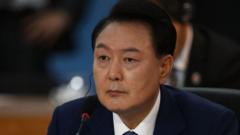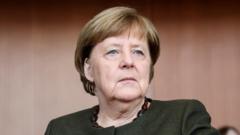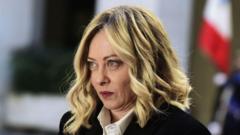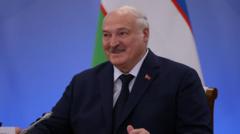Embattled President Yoon Suk Yeol of South Korea insists that his recent declaration of martial law was necessary to safeguard democracy, stirring widespread protests and political unrest.
Tensions Escalate as South Korea's President Yoon Declares Martial Law

Tensions Escalate as South Korea's President Yoon Declares Martial Law
President Yoon Suk Yeol defends controversial martial law amid growing political turmoil in South Korea.
In a dramatic televised address, South Korean President Yoon Suk Yeol asserted his decision to implement martial law last week was aimed at upholding democracy in the face of what he described as a threat posed by opposition forces' actions. Yoon, facing intense scrutiny, argued that the martial law was a legal step to thwart what he referred to as a "parliamentary dictatorship."
Despite ongoing investigations over insurrection allegations, Yoon has committed to remain in office. "I will stand firm whether I'm impeached or investigated," he declared, asserting his intention to "fight to the end." Under his leadership, friction has escalated, leading to votes in parliament to impeach various officials, including police chief Cho Ji-ho and justice minister Park Sung-jae.
Though his initial effort to stave off impeachment failed when members of his own party boycotted the vote, a second attempt is planned for Saturday. Yoon's party leader, Han Dong-hoon, has publicly acknowledged the president's unwillingness to resign early and implored his colleagues to back the impeachment.
Yoon continues to frame his actions as protective measures against what he interprets as threats from opposition lawmakers and North Korea sympathizers. His martial law declaration provoked immediate protests, culminating in clashes with security forces at the National Assembly and a brief political lockdown before lawmakers successfully blocked the order.
The tumult surrounding Yoon comes on the heels of significant opposition victories in the general elections, positioning his government in a precarious spot. With mounting calls for his impeachment, public outcry has intensified, resulting in widespread protests and strikes throughout the nation. Amidst this backdrop, the former defense minister, who resigned in the wake of the martial law declaration, was taken to the hospital following a suicide attempt in custody, underscoring the personal toll of the burgeoning crisis.
As the political landscape shifts, South Korea remains vigilant and divided over the future of its presidency and democratic institutions.
Despite ongoing investigations over insurrection allegations, Yoon has committed to remain in office. "I will stand firm whether I'm impeached or investigated," he declared, asserting his intention to "fight to the end." Under his leadership, friction has escalated, leading to votes in parliament to impeach various officials, including police chief Cho Ji-ho and justice minister Park Sung-jae.
Though his initial effort to stave off impeachment failed when members of his own party boycotted the vote, a second attempt is planned for Saturday. Yoon's party leader, Han Dong-hoon, has publicly acknowledged the president's unwillingness to resign early and implored his colleagues to back the impeachment.
Yoon continues to frame his actions as protective measures against what he interprets as threats from opposition lawmakers and North Korea sympathizers. His martial law declaration provoked immediate protests, culminating in clashes with security forces at the National Assembly and a brief political lockdown before lawmakers successfully blocked the order.
The tumult surrounding Yoon comes on the heels of significant opposition victories in the general elections, positioning his government in a precarious spot. With mounting calls for his impeachment, public outcry has intensified, resulting in widespread protests and strikes throughout the nation. Amidst this backdrop, the former defense minister, who resigned in the wake of the martial law declaration, was taken to the hospital following a suicide attempt in custody, underscoring the personal toll of the burgeoning crisis.
As the political landscape shifts, South Korea remains vigilant and divided over the future of its presidency and democratic institutions.





















